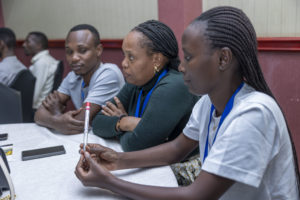GBV victims face significant challenges in securing justice due to inadequate forensic science practices and a lack of awareness among medical professionals and the community about the importance of preserving evidence. This makes it difficult to hold perpetrators accountable. Empowering professionals and practitioners in forensic science is crucial to improving evidence collection and analysis, ultimately fostering justice for GBV victims.
In 2024, Haguruka formalize a Memorandum of Understanding (MoU) Rwanda Forensic Institute (RFI) focused on bolstering forensic science capacity among healthcare professionals involved in GBV cases. Haguruka led extensive training programs for 96 medical doctors and 96 nurses, emphasizing best practices in evidence collection, documentation, preservation, and chain of custody. The training incorporated trauma-informed care principles to create a supportive environment for victims, encouraging them to share information and facilitate more effective evidence gathering. Crucially, the partnership aimed to decentralize access to essential services like DNA testing for victims, especially teen mothers. Public awareness campaigns were launched to reinforce the importance of preserving forensic evidence in cases of GBV.
The training empowered medical professionals to handle GBV cases more effectively and with greater sensitivity. Improved documentation, adherence to the chain of custody, and the implementation of trauma-informed care protocols resulted in a significant increase in the quality and reliability of forensic evidence. This directly contributed to a stronger legal foundation for GBV cases, resulting in more successful prosecutions and a greater deterrent effect on perpetrators.
“We have been managing evidence storage, but we faced challenges in proper documentation and preservation. This training has equipped us with essential skills that will enable us to ensure accurate and complete information is provided to the police. We are now better prepared to support GBV case management effectively.” – Nizeyimana Jean Damscène, Gisenyi Hospital, Rubavu District.
The partnership fostered a more collaborative approach among various institutions (such as the RIB, MINISANTE and MIGEPROF) involved in GBV response. Improved referral mechanisms and enhanced awareness of victims’ rights, promoted through targeted outreach, further solidified the systemic shift towards better support for survivors. This initiative underscores the collective responsibility in achieving justice, empowering the community and victims to actively participate in the process.


